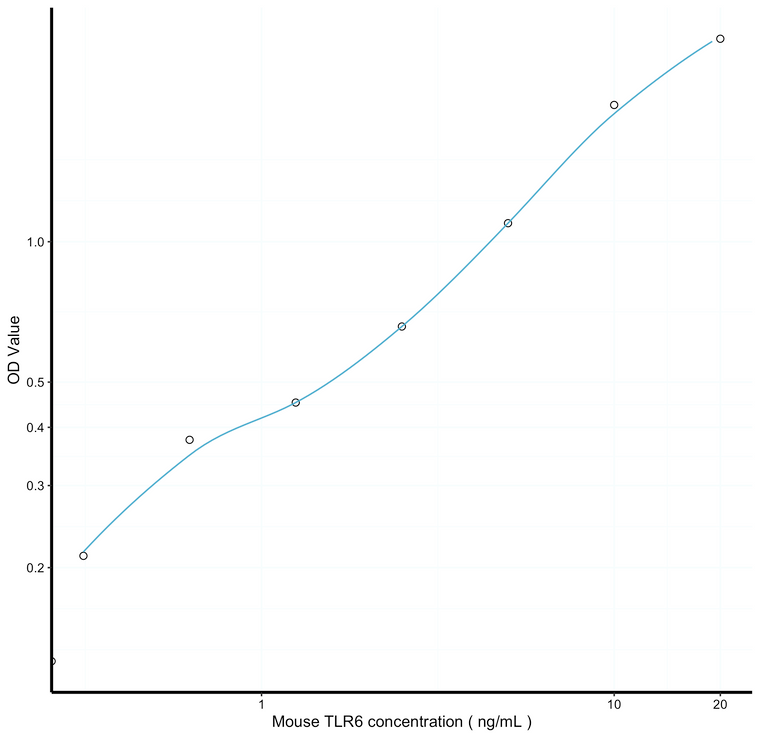| Applications: |
ELISA |
| Reactivity: |
Mouse |
| Note: |
STRICTLY FOR FURTHER SCIENTIFIC RESEARCH USE ONLY (RUO). MUST NOT TO BE USED IN DIAGNOSTIC OR THERAPEUTIC APPLICATIONS. |
| Sensitivity: |
0.125ng/mL |
| Detection Limit: |
0.312-20ng/mL |
| Short Description: |
This TLR6 Sandwich ELISA Kit, Ready-To-Use is an in-vitro enzyme-linked immunosorbent assay for the measurement of samples in mouse cell culture supernatant, serum and plasma (EDTA, citrate, heparin). |
| Storage Instruction: |
The whole kit may be stored at-20°C for up to 12 months from receipt. An unopened kit may be stored in the fridge at 2-8°C for up to 6 months. Once opened store individual kit contents according to components table provided with the kit. |
| Assay Time: |
3 hrs |
| Gene Symbol: |
Tlr6 |
| Gene ID: |
21899 |
| Uniprot ID: |
TLR6_MOUSE |
| Immunogen Region: |
Ready-To-Use |
| Sample Type: |
tissue homogenates, cell lysates, cell culture supernates or other biological fluids. |
| Tissue Specificity | Detected in thymus, spleen, ovary and lung. Expressed in macrohpages. |
| Post Translational Modifications | |
| Function | Participates in the innate immune response to Gram-positive bacteria and fungi. Specifically recognizes diacylated and, to a lesser extent, triacylated lipopeptides. In response to diacylated lipopeptides, forms the activation cluster TLR2:TLR6:CD14:CD36, this cluster triggers signaling from the cell surface and subsequently is targeted to the Golgi in a lipid-raft dependent pathway. Acts via MYD88 and TRAF6, leading to NF-kappa-B activation, cytokine secretion and the inflammatory response. Recognizes mycoplasmal macrophage-activating lipopeptide-2kD (MALP-2), soluble tuberculosis factor (STF), phenol-soluble modulin (PSM) and B.burgdorferi outer surface protein A lipoprotein (OspA-L) cooperatively with TLR2. In complex with TLR4, promotes sterile inflammation in monocytes/macrophages in response to oxidized low-density lipoprotein (oxLDL) or amyloid-beta 42. In this context, the initial signal is provided by oxLDL- or amyloid-beta 42-binding to CD36. This event induces the formation of a heterodimer of TLR4 and TLR6, which is rapidly internalized and triggers inflammatory response, leading to the NF-kappa-B-dependent production of CXCL1, CXCL2 and CCL9 cytokines, via MYD88 signaling pathway, and CCL5 cytokine, via TICAM1 signaling pathway, as well as IL1B secretion. |
| Protein Name | Toll-Like Receptor 6Cd Antigen Cd286 |
| Database Links | Reactome: R-MMU-5686938 |
| Cellular Localisation | Cell MembraneSingle-Pass Type I Membrane ProteinCytoplasmic VesiclePhagosome MembraneMembrane RaftGolgi ApparatusUpon Complex Formation With Cd36 And Tlr4Internalized Through Dynamin-Dependent EndocytosisDoes Not Reside In Lipid Rafts Before Stimulation But Accumulates Increasingly In The Raft Upon The Presence Of The Microbial LigandIn Response To Diacylated LipoproteinsTlr2:Tlr6 Heterodimers Are Recruited In Lipid RaftsThis Recruitment Determine The Intracellular Targeting To The Golgi Apparatus |
| Alternative ELISA Names | Toll-Like Receptor 6 ELISA kitCd Antigen Cd286 ELISA kitTlr6 ELISA kit |
| output | |
Information sourced from Uniprot.org
12 months for antibodies. 6 months for ELISA Kits. Please see website T&Cs for further guidance







